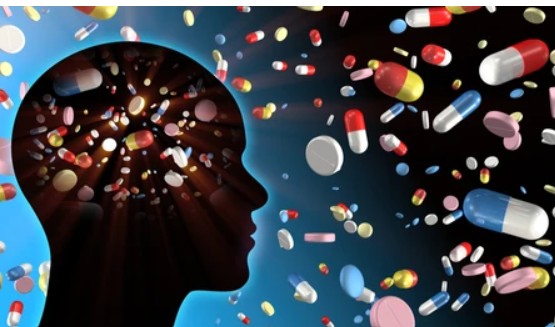The world of psychology has operated under a cloak of mystery for a long time, until it was exposed for being behind some of the most manipulative and absurd developments in human history: from Sigmund Freud’s diabolical claim that sexually abused children were displaying signs of trauma (not due to the abuse) but due to misplaced attraction towards their parents, or Edward Barnay’s using psychological manipulation to influence consumer behaviour, and destroy constructive social norms. But, perhaps one of the most evil contributions of psychology is through its collaboration with pharmakeia, and the birth of psychiatry. Revelatory information is coming to the fore, exposing the lies that have sustained this industry and its interventions. And so today, we ought to discuss this further, in light of The War Against the Corruption in the Psychiatric Drug Industry.
STATISTICAL CORRUPTION IN THE RESPONSE RATES IN PSYCHIATRIC DRUG TRIALS
“The War Against the Corruption in the Psychiatric Industry”, and we ought to begin with the fact that the outcomes used in psychiatric drug trials are not meaningful, and psychiatric diagnoses and names of drug classes are also problematic. According to the Diagnostic and Statistical Manual of Mental Disorders, Fifth Edition (or DSM-5), which is the standard classification of mental disorders used by mental health professionals in the United States, major depression “causes clinically significant distress or impairment in social, occupational, or other important areas of functioning.” It is the other way around. People become depressed because of spiritual afflictions, medications they take, or because they have difficulties in their lives. Seldom is it because they are attacked by some arbitrary depression monster that can be killed with so-called antidepressants, in the same way that antibiotics are supposed to kill bacteria.
Furthermore, patients want to have normal levels of functioning and to enjoy a meaningful life. Yet, there has not been a single placebo-controlled trial of depression drugs that reported on such outcomes except one, which was unethical because the drugs were abruptly withdrawn in half the patients, which harmed them substantially, as they developed abstinence symptoms. The study was based on the understanding that patients on paroxetine reported statistically significant deterioration in functioning at work, relationships, social activities, and overall functioning. But, the study was also by Eli Lilly, the manufacturer of fluo-xetine, which has an active metabolite with a half-life of one to two weeks. And so, to manipulate the outcome, and try to prove a comparative advantage of using fluo-xetine (as opposed to paroxetine), the drugs were abruptly withdrawn in half the patients. Thus, little harm will be done to patients on fluoxetine during a five-day period where the drug was changed to a placebo unbeknownst to the patients (hence the unethical conduct).
But, in addition to such acts of corruption during trials, the outcomes in psychiatric drug trials are measured on rating scales even though the results cannot tell us whether the patients have improved in any way that is important for them. But we can exclude this possibility because the effects obtained with such scales are considerably lower than the least clinically relevant difference to placebo, both for depression drugs and psychosis drugs. Thus, the drugs don’t work, not even for very severe degrees of depression. And yet, this is not what the patients are being told.
So, how did we get to this point? I think it is because pharmaceutical companies never had an objective and observable benefit to prove. And this is because psychiatric diagnoses often do not have a biological basis, and are rather a standardised observation. You’d recall that we have discussed this here on ‘The War Room’ with respect to ADHD (which uses a questionnaire to justify putting expectedly active children on meds), or even gender dysphoria – which is quite simply not a thing, except body discomfort that comes with puberty, or social contagion.
STUDY 329: A JARRING EXAMPLE OF SCIENTIFIC FRAUD IN THE PSYCHIATRIC DRUG MARKET
However, the issues we’ve just described are not exclusive to Eli-Lily. In 2001, the Journal of the American Academy of Child & Adolescent Psychiatry (JAACAP) published a paper declaring that the antidepressant paroxetine (Paxil) was “generally well tolerated and effective” for adolescent depression. Well, that conclusion was false. The manufacturer, being GlaxoSmithKline (GSK), knew from its own data that the drug failed to outperform placebo and carried a serious risk of suicidal behaviour. BUT, instead of telling the truth, in one internal email, company executives admitted the results were “commercially unacceptable” and that disclosure of the poor efficacy data would “undermine the profile of paroxetine.” And so, rather than accept the failure, GSK set out to disguise it as success. The company hired a PR firm to draft a manuscript that cherry-picked favourable outcomes and buried unfavourable data. It became known as Study 329 — one of the most infamous cases of scientific fraud in modern psychiatry.
And how it was curated is that, while none of the drug’s primary endpoints were met, the authors selectively analysed secondary measures, and thus claimed that Paxil was “effective and well tolerated.” The paper listed 22 authors — two were GSK employees, and most had never reviewed the raw data or disclosed their financial ties to the company. Once the article appeared in print, GSK’s sales force distributed it to thousands of doctors as “proof” that Paxil worked in teens. Within three years, GSK made more than a billion dollars from what it called the “adolescent market.”
And for years, the fraud stood unchallenged. Regulators issued warnings but never forced a correction. The journal refused to retract. The paper remained in circulation — cited hundreds of times, shaping prescribing habits, and legitimising a lie that cost young lives.
AN INCENTIVE FOR CORRUPTION: PSYCHIATRIC DRUGS PRESENTED AS CHRONIC MEDICATION
Let’s also revisit the relationship between psychology and pharmakeia, also known as big pharma – ultimately to explain that there is an incentive for corruption in the psychiatric drug market, which is primarily driven by a shift that characterised psychiatric drugs as chronic medication. Now, as you’d be aware, psychiatric medicines work by altering the nervous system. Stopping or decreasing too fast is a wrenching physical adjustment that can create the same states the drugs are meant to fix: depression, anxiety, confusion, and more. Even unpleasant feelings in the brain itself.
However, although psychiatric medications have existed since the 1950s, the idea of taking them permanently gained ground around the 1980s, as a biological view of mental “illness” replaced a more psychological one. Drugs like Prozac were promoted as correcting the “chemical imbalance” causing depression, an imbalance that would theoretically be lifelong. Pharmaceutical companies, seeing lifelong patients of psychiatric drugs as a profit making avenue, obviously embraced the idea.
As a result of this, a shift occurred then from defining [mental states] as episodic, temporary experiences to incurable brain diseases. Psychiatric language ALSO shifted from using terms like “reaction” or “disturbance” to “disorder” and “disease.” This was intended in part to reduce stigma. BUT the shift also had striking consequences for big pharma’s ability to have life long patients. This is to say that depression (for example) that is a “reaction” or “disturbance” implies not just a limit but an origin, while “disorder” does not—furthermore, the former terms emphasises cause over chemicals.
However, beyond the definitional changes, there was also a practical problem with this shift in seeing mental illness as a chronic suffering. In particular, medications like antipsychotics, anti-anxiety drugs, and antidepressants were in most cases developed for short-term use. Many trials of psychiatric drugs last less than two months, even though the length of time spent on a medication increases the difficulty of stopping it. ALL of this to say that there is an abundance of research that shows the harms of psychotropic, or antipsychotic drugs – but despite that, these drugs are prescribed as chronic medication exposing patients to far greater harm, all so pharmaceutical companies like GSK can make great profits.
BIG PHARMA-FUNDED PSYCHIATRISTS CLAIM THERE IS NO WITHDRAWAL FROM PSYCHIATRIC DRUGS
Despite these problems, you’d recall that we’ve highlighted that psychology made staying on psychiatric drugs something of a virtue; in that “staying on meds” has become not just the likely outcome in psychiatry but a test of virtue. “Good” patients are said to be those that stay on meds, while bad patients don’t, often because they’re “so sick they do not even know they’re sick.” This mentality is rooted in the presumption that to take meds is to acknowledge there’s something wrong with you; to shun them means something even worse. Yet drug withdrawal is far slower and harder than most people, including doctors, realise. Its effects are often misread as a return of symptoms. And yet, big pharma is paying psychiatrists to claim that this is not the case!
More specifically, psychiatrists have been accused of downplaying the risks of antidepressant withdrawal in a new study. The paper claims, with confidence, that withdrawal symptoms from antidepressants are minimal and easily managed, contradicting previous evidence. It also suggests that patients should be reassured when discontinuing medication. The study was led by researchers at Imperial College London and King’s College London. They identified the types and frequencies of the symptoms people experience when stopping antidepressants. They found that “most people do not experience severe withdrawal”. The paper claims that symptoms are usually “mild” and “short-lived”. However, psychiatrists, psychologists and patients have widely criticised the study due to its reliance on short-term clinical trials lasting only 8-12 weeks. The reality is that people most often use antidepressants for years. Alongside this, it ignores the lived experience of thousands of people (which is valuable empirical experience-based insight).
In the UK alone, there are around nine million people on antidepressants. Long-term use of antidepressants has been linked to weight gain, bleeding, emotional numbness, suicidal thoughts and feelings, falls, and additional poorer long-term outcomes. And since the 90s, patients have reported unpleasant withdrawal symptoms when stopping the medications. Furthermore, a 2024 Lancet review discovered that one in six people will experience discontinuation symptoms when stopping antidepressants. Another study found that for 40% of people, withdrawal symptoms lasted over two years, with 80% of these people moderately or severely impacted by them. In total, one in four were unable to stop the medications and returned to them.
Studies also suggest that the longer someone takes an antidepressant, the more likely they are to experience prolonged and severe withdrawal symptoms. And so, this raises big questions about the number of people who try, fail and ultimately continue taking the medication for the rest of their lives. Evidently psychiatric drugs, and in particular antidepressants are really difficult to stop consuming.
SELECTIVE SEROTONIN REUPTAKE INHIBITORS (SSRIs): HARMFUL EVEN TO THOSE NOT TAKING THEM
So, considering how addictive, dangerous and yet ineffective for the claimed purpose these drugs are, we then ought to ask ourselves: if these psychiatric drugs are not proven to be effective, then what are they used for (besides serving as a profit making avenue for pharmaceutical companies who know they are not making people better? Well, SSRIs are a crucial focus in answering this question. Many holistic practitioners view Selective Serotonin Reuptake Inhibitors (SSRIs)—a class of antidepressants—as among the most dangerous widely prescribed medications available. Unlike other drugs that are simply ineffective or unsafe, SSRIs present a distinctive risk: they can lead to fatalities even among those not taking them.
Since their introduction, observers have noted a striking link between SSRI use and uncharacteristic episodes of violent psychosis, including horrific homicides or suicides committed by users. Over time, mounting evidence—from lawsuits against pharmaceutical companies to clinical data—has strengthened the case that SSRIs can trigger such psychotic violence. Concurrently, as SSRI prescriptions have surged, incidents of gruesome killings have increased.
The pharmaceutical industry and mainstream media have typically dismissed these patterns as mere correlation without causation. Yet, acknowledgment of SSRI-related violence risks has grown (for instance, RFK Jr. highlighted them in his presidential campaign and stood firm under scrutiny). Meanwhile, after each mass shooting, media outlets often push a familiar narrative: calls to ban guns and expand mental health services (often implying wider prescription of psychiatric drugs, including SSRIs). This rote response is increasingly losing credibility, with SSRIs themselves coming under direct scrutiny in post-incident discussions.
WITH SSRIs CORRELATION DOES (IN FACT) EQUAL CAUSATION
One of the most common arguments used to dismiss the link between SSRIs and psychotic violence is that people who are mentally ill are more likely to be on psyche meds, so the “correlation” between psych meds and psychotic violence is simply a product of pre-existing mental illness and would have happened independently of the psyche med.
However, while claiming “correlation is not causation” makes it possible to refute this link while sounding intelligent in the process, there are a number of major problems with this argument. First, there is a lot of evidence tying SSRI usage to these events, including clinical trial data that was hidden from the public. Second, there is often a black-box warning on the SSRIs for them increasing the risk of suicide, something which can only be possible if some degree of causation does in fact exist. Third, these psychotic events are completely out of character for the individuals who commit them, and in many cases they report a very similar (and disconcerting) narrative of what they experienced prior to and during the shooting.
Furthermore, selective serotonin reuptake inhibitors (being SSRIs) have a similar primary mechanism of action to cocaine! These are similar to cocaine in that cocaine blocks the reuptake of Serotonin, Norepinephrine, and Dopamine. And so, considering that SSRIs have this chemical effect, much like cocaine does, clearly, correlation between SSRIs and mass shootings or psychotic behaviour DOES equal causation. [PAUSE] And this is why SSRIs keep reappearing in discussions of people with mental illnesses that are found at the centre of mass shootings or other questionable and fatal behaviours.
THE PHARMACEUTICAL LOBBY’S ROLE IN COVERING THE DANGERS OF SSRIs
With what we’ve just discussed: from the addictive nature of psychiatric drugs, to the dangers of SSRIs, immediately, we have to ask why this information is not as mainstream as it should be – especially considering the number of people consuming these drugs. First, as we’ve discussed here on the War Room a number of times, this has to do with the pharmaceutical lobby and the tactics that it uses to cover its ills – ranging from lobbying government to implement legislation that protects the pharmaceutical industry from being held liable, to manipulating political processes through corrupting politicians with financial incentives, and also establishing quid-pro-quo relationship with doctors when they over prescribe their drugs.
But, the other crucial reason that this information was not as mainstream as it ought to be is because the pharmaceutical lobby also captured the mainstream media through advertising revenue, which allows them to regulate what is said about pharmaceutical products.
What makes the revelation of the corruption in the psychiatric drug industry so much more concerning is that when people under psychiatric care commit suicide or homicide, or are killed or seriously harmed, because of medical malpractice, it is extremely rare that it has any consequences for the doctors. Psychiatry seems to be among the areas in society where the law is being systematically violated all over the world. Even Ombudsman and Supreme Court decisions are being ignored.
For instance, in the year 2003, using scientific arguments, lawyer Jim Gottstein convinced the Supreme Court in Alaska to decide that the government cannot drug patients against their will without first proving by clear and convincing evidence that it is in their best interests and that there is no less intrusive alternative available. BUT, unfortunately, this victory for human rights has not created a precedent in Alaska, where the authorities continue to force people into being treated with antipsychotics. Just like everywhere else. And yet, today’s discussion proves that there is no objective benefit of psychiatric drugs, that manufacturers have a history of falsifying safety and effectiveness, and even that these drugs harm both those who ingest them and those who do not. There is a need for urgent change in this respect, which is why we have a categorical imperative to use the weapons of our warfare, which are not carnal, but mighty through God to the pulling down of strong holds.
Written By Lindokuhle Mabaso



